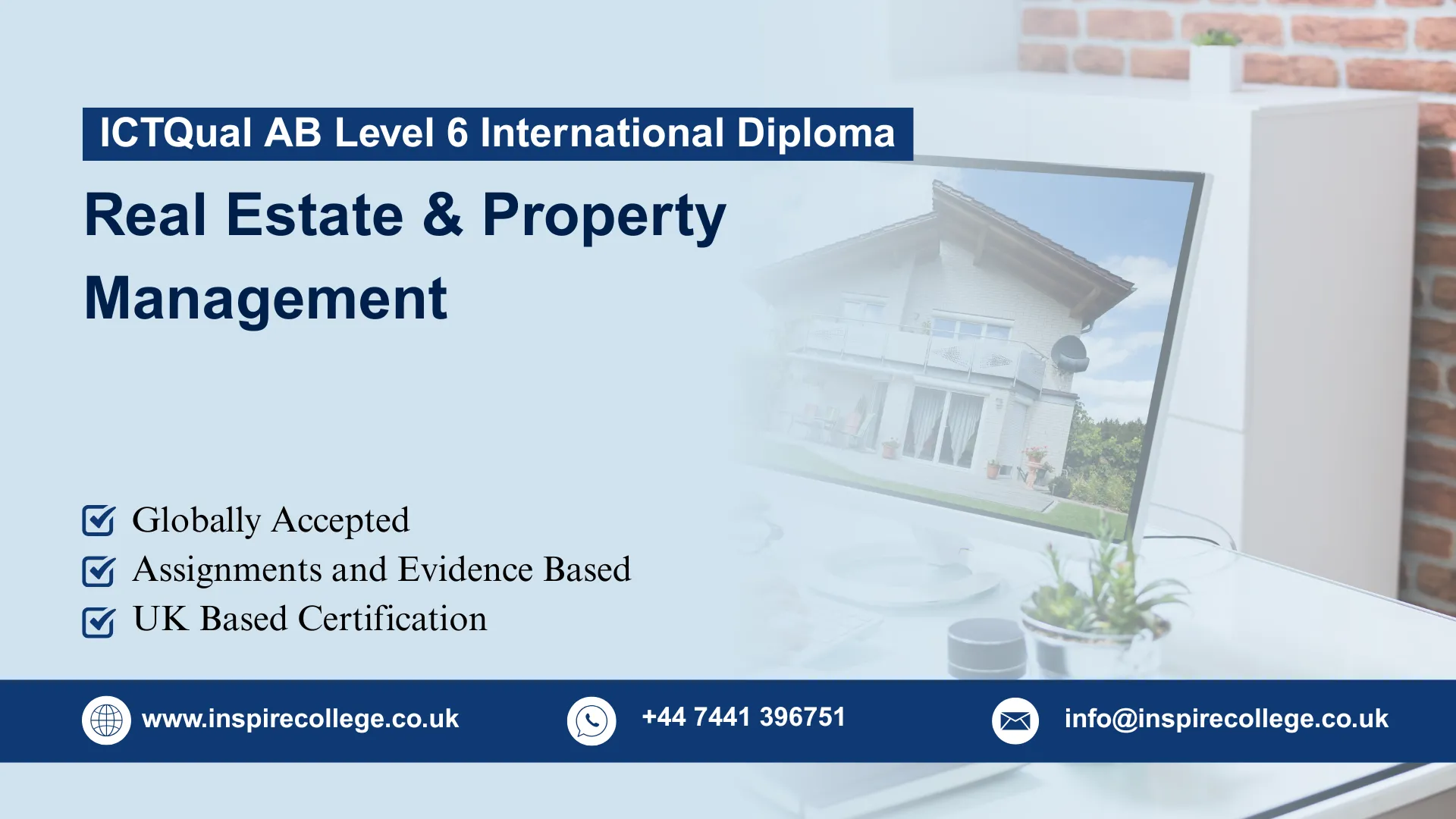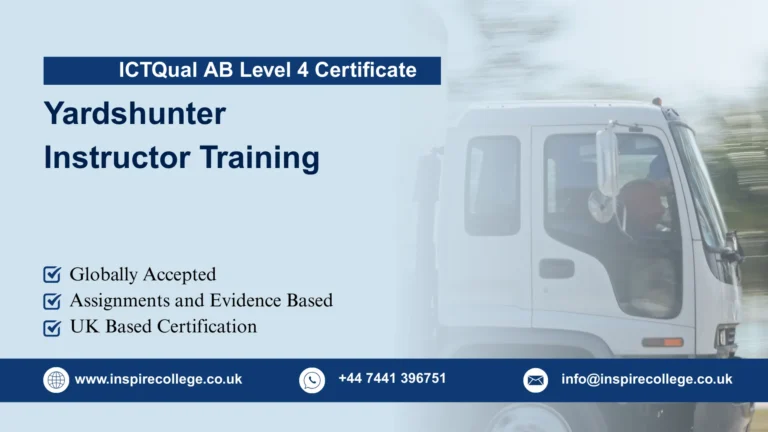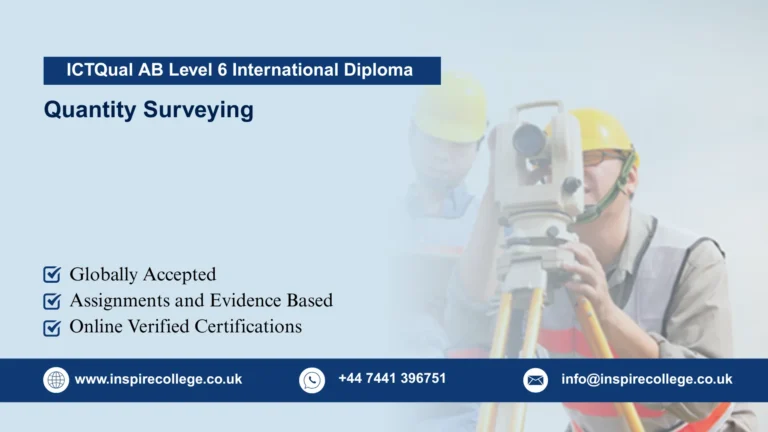
ICTQual AB Level 6 International Diploma in Real Estate & Property Management
The ICTQual AB Level 6 International Diploma in Real Estate & Property Management is a globally recognised qualification designed for learners eager to excel in the dynamic property and real estate sector. Spanning three years and structured across 360 credits, this comprehensive programme equips learners with the knowledge, skills, and practical expertise required to thrive in an increasingly competitive industry.
This diploma is ideal for both fresh learners seeking a strong foundation in property management and professionals aiming to advance their career prospects. The programme covers key areas such as property valuation, asset management, investment analysis, property law, and sustainable urban development, ensuring learners gain a holistic understanding of the real estate ecosystem.
By completing this course, learners develop a wide range of industry-relevant skills, including strategic property management, financial analysis, risk assessment, negotiation, and project planning. These competencies open diverse career opportunities in property consultancy, real estate investment, facilities management, asset development, and urban planning.
The diploma provides long-term professional value, offering learners a recognised credential that enhances credibility, employability, and global career mobility. Graduates emerge ready to implement best practices, adopt innovative solutions, and contribute meaningfully to property and real estate management at both local and international levels.
Enrolling in the ICTQual AB Level 6 International Diploma in Real Estate & Property Management empowers learners to build a strong career trajectory, gain practical expertise, and achieve professional excellence in a sector that continues to grow and evolve globally.
To enrol in the ICTQual AB Level 6 International Diploma in Real Estate & Property Management, learners must meet the following entry requirements:
- Age Requirement: Learners must be at least 18 years old at the time of enrolment.
- Educational Requirement: Candidates should hold a Level 5 Diploma, Higher National Diploma (HND), or equivalent in real estate, property management, business, or related disciplines; freshers with strong foundational knowledge may also be considered.
- Professional Experience: While not mandatory, learners with 1–2 years of relevant experience in property management, real estate, or related fields are encouraged to apply.
- English Language Proficiency: Learners must demonstrate proficiency in English through IELTS (5.5 or above), TOEFL, or an equivalent to engage effectively with course materials and assessments.
- Related Courses: This diploma complements other ICTQual AB programmes, such as the Level 5 International Diploma in Property Management or the Level 6 International Diploma in Real Estate Investment, providing a clear pathway for career progression.
Mandatory Units
This qualification, the ICTQual AB Level 6 International Diploma in Real Estate & Property Management, consists of 36 mandatory units.
Year 1 – Foundation in Real Estate & Property Management
- Principles of Real Estate and Property Management
- Introduction to Property Development Projects
- Construction Materials and Methods in Property
- Property Valuation Fundamentals
- Project Planning and Scheduling in Property Management
- Health, Safety, and Environmental Awareness in Property
- Communication and Stakeholder Management in Real Estate
- Digital Tools and Property Management Systems
- Financial Management in Property Projects
- Quality Assurance and Control in Property Management
- Legal and Regulatory Frameworks in Real Estate
- Professional Ethics and Conduct in Property Management
Year 2 – Intermediate Real Estate & Property Management Practices
- Advanced Property Valuation Techniques
- Resource Management and Allocation in Property Projects
- Project Cost Estimation and Budgeting in Real Estate
- Lease Administration and Contract Management
- Procurement and Supply Chain Management in Property
- Risk Analysis and Mitigation in Property Management
- Leadership and Team Management in Property Projects
- Facilities and Site Management
- Sustainable Development and Environmental Management in Real Estate
- Project Monitoring and Reporting in Property Management
- Problem-Solving and Decision-Making in Real Estate Projects
- Communication and Negotiation Skills in Property Management
Year 3 – Advanced Real Estate & Strategic Leadership
- Strategic Property Management and Investment
- Advanced Infrastructure and Property Planning
- Real Estate Portfolio Management
- Innovation and Emerging Technologies in Property
- Advanced Risk and Crisis Management in Property Projects
- Contract Management and Legal Compliance in Real Estate
- Leadership in Real Estate Projects
- Advanced Project Control and Performance Measurement
- Project Governance and Compliance in Property Management
- Research Methods and Project Analysis in Real Estate
- Capstone Project in Real Estate & Property Management
- Professional Development and Career Planning
Learning Outcomes for the ICTQual AB Level 6 International Diploma in Real Estate & Property Management:
Year 1 – Foundation in Real Estate & Property Management
Principles of Real Estate and Property Management
- Understand the roles and responsibilities of property managers, landlords, and stakeholders.
- Analyse the structure, functions, and operations of real estate markets.
- Apply core management principles to maintain and enhance property value.
- Evaluate property management strategies for residential, commercial, and mixed-use assets.
- Develop decision-making skills for day-to-day property management challenges.
Introduction to Property Development Projects
- Explain the key stages of property development from site selection to completion.
- Assess project feasibility and risk factors in development planning.
- Apply basic project management techniques to property development scenarios.
- Identify stakeholder roles and responsibilities in development projects.
- Analyse case studies to understand common challenges in property development.
Construction Materials and Methods in Property
- Identify and evaluate construction materials used in residential and commercial projects.
- Understand construction techniques, methods, and building standards.
- Assess the suitability of materials based on cost, quality, and sustainability.
- Apply knowledge of construction methods to property development planning.
- Recognise the impact of material choice on project timelines and budgets.
Property Valuation Fundamentals
- Demonstrate understanding of basic property valuation approaches and methods.
- Analyse factors affecting property values, including location, condition, and market trends.
- Prepare simple property valuation reports for residential and commercial assets.
- Apply valuation principles to investment and management decisions.
- Understand ethical considerations in property valuation practices.
Project Planning and Scheduling in Property Management
- Develop project plans and schedules using industry-standard tools.
- Apply critical path analysis and Gantt charts to monitor timelines.
- Identify dependencies, milestones, and resource requirements.
- Adjust project plans to address delays or changes in scope.
- Evaluate project progress against objectives and timelines.
Health, Safety, and Environmental Awareness in Property
- Identify key health, safety, and environmental regulations affecting property projects.
- Conduct risk assessments and implement mitigation strategies.
- Promote safe working environments for staff and contractors.
- Apply sustainable practices to reduce environmental impact.
- Monitor compliance with safety standards throughout project lifecycles.
Communication and Stakeholder Management in Real Estate
- Develop effective communication strategies for clients, tenants, and stakeholders.
- Analyse stakeholder expectations and influence decision-making.
- Apply negotiation techniques to resolve conflicts and achieve outcomes.
- Maintain professional relationships with internal and external parties.
- Prepare clear reports and presentations for stakeholder engagement.
Digital Tools and Property Management Systems
- Utilise property management software and digital tools to track operations.
- Analyse data to improve property performance and decision-making.
- Implement technology solutions for scheduling, budgeting, and reporting.
- Understand the role of emerging technologies in property management.
- Evaluate digital systems to enhance efficiency and service quality.
Financial Management in Property Projects
- Prepare budgets, financial forecasts, and cash flow projections.
- Analyse project costs, revenue streams, and investment returns.
- Apply financial principles to decision-making in property management.
- Monitor financial performance and implement corrective actions.
- Understand taxation, accounting standards, and compliance in property finance.
Quality Assurance and Control in Property Management
- Apply quality standards and best practices in property operations.
- Monitor service delivery to ensure compliance with organisational objectives.
- Identify defects or non-compliance and implement corrective measures.
- Evaluate processes to enhance efficiency and customer satisfaction.
- Maintain documentation for audits and regulatory inspections.
Legal and Regulatory Frameworks in Real Estate
- Understand national and international property laws and regulations.
- Apply legal principles in lease agreements, contracts, and transactions.
- Ensure compliance with building codes, zoning, and planning regulations.
- Analyse regulatory risks affecting property development and management.
- Advise stakeholders on legal obligations and best practices.
Professional Ethics and Conduct in Property Management
- Demonstrate integrity and ethical decision-making in property management.
- Understand professional codes of conduct and standards.
- Apply ethical principles to conflict resolution and stakeholder management.
- Promote transparency, accountability, and fairness in all property dealings.
- Develop a professional reputation aligned with industry expectations.
Year 2 – Intermediate Real Estate & Property Management Practices
Advanced Property Valuation Techniques
- Apply income, comparative, and cost-based valuation methods.
- Analyse market trends and investment potential for accurate property valuations.
- Prepare detailed, professional valuation reports.
- Conduct due diligence to support investment decisions.
- Ensure compliance with valuation standards and ethical guidelines.
Resource Management and Allocation in Property Projects
- Plan and allocate human, financial, and material resources effectively.
- Monitor utilisation to optimise productivity and efficiency.
- Evaluate resource management strategies for cost-effectiveness.
- Resolve conflicts and adjust allocations as project needs change.
- Apply resource planning tools for large-scale property projects.
Project Cost Estimation and Budgeting in Real Estate
- Develop accurate cost estimates for property development and management projects.
- Prepare and monitor project budgets to control expenditure.
- Apply cost control techniques to prevent budget overruns.
- Analyse financial data to support investment and operational decisions.
- Understand the impact of inflation, market changes, and risks on project costs.
Lease Administration and Contract Management
- Manage lease agreements, renewals, and tenant communications.
- Apply contract law principles in property transactions.
- Analyse and mitigate legal and financial risks in lease management.
- Ensure compliance with contractual obligations and regulatory requirements.
- Maintain accurate records and reporting for all lease and contract activities.
Procurement and Supply Chain Management in Property
- Implement procurement strategies for materials, services, and contractors.
- Evaluate suppliers for quality, cost, and reliability.
- Manage supply chain processes to ensure timely delivery.
- Apply negotiation techniques to optimise procurement outcomes.
- Ensure compliance with procurement policies and sustainability practices.
Risk Analysis and Mitigation in Property Management
- Identify operational, financial, and environmental risks in property projects.
- Develop mitigation strategies and contingency plans.
- Monitor and review risk management effectiveness continuously.
- Apply risk assessment frameworks to minimise potential losses.
- Communicate risks and mitigation plans to stakeholders effectively.
Leadership and Team Management in Property Projects
- Apply leadership theories and management techniques to property teams.
- Motivate and manage team performance to achieve project goals.
- Resolve conflicts and foster a collaborative work environment.
- Delegate responsibilities effectively to ensure accountability.
- Develop strategies to enhance team efficiency and project outcomes.
Facilities and Site Management
- Oversee maintenance and operations of residential and commercial properties.
- Apply health, safety, and operational standards in facility management.
- Monitor site performance and operational efficiency.
- Implement preventive maintenance and service schedules.
- Analyse operational data to identify improvements in facility management.
Sustainable Development and Environmental Management in Real Estate
- Apply sustainability principles in property design and management.
- Evaluate environmental impacts and compliance requirements.
- Promote green building practices and energy efficiency.
- Integrate sustainable strategies in long-term property planning.
- Monitor and report on environmental performance of property assets.
Project Monitoring and Reporting in Property Management
- Track project progress against objectives and timelines.
- Prepare reports highlighting performance, risks, and outcomes.
- Analyse data to inform decisions and corrective actions.
- Ensure transparency and accountability in project reporting.
- Use reporting tools and software to communicate effectively with stakeholders.
Problem-Solving and Decision-Making in Real Estate Projects
- Apply analytical frameworks to solve complex property management issues.
- Make informed decisions based on financial, operational, and market data.
- Evaluate potential outcomes to choose optimal solutions.
- Implement problem-solving techniques in real-world scenarios.
- Monitor results to ensure decisions achieve intended objectives.
Communication and Negotiation Skills in Property Management
- Develop advanced communication strategies for diverse stakeholders.
- Apply negotiation techniques to secure favourable outcomes.
- Manage conflicts and disputes professionally and effectively.
- Present property proposals clearly and persuasively.
- Build and maintain strong professional relationships.
Year 3 – Advanced Real Estate & Strategic Leadership
Strategic Property Management and Investment
- Develop long-term strategies for property portfolios and investment.
- Analyse market trends, risk factors, and financial returns.
- Evaluate and optimise property investment performance.
- Make informed strategic decisions for asset growth and management.
- Align investment strategies with organisational objectives.
Advanced Infrastructure and Property Planning
- Integrate planning, regulatory, and economic considerations in property projects.
- Develop advanced infrastructure plans for residential and commercial assets.
- Apply project planning tools to optimise timelines and resources.
- Evaluate the impact of urban development and infrastructure on property value.
- Implement planning strategies aligned with sustainability and growth objectives.
Real Estate Portfolio Management
- Manage multiple property assets strategically to maximise returns.
- Analyse portfolio performance and investment opportunities.
- Apply risk management techniques to portfolio decisions.
- Monitor financial, operational, and market data for performance evaluation.
- Make recommendations to optimise portfolio growth and sustainability.
Innovation and Emerging Technologies in Property
- Explore innovative technologies shaping property management and investment.
- Implement digital tools, smart systems, and data analytics in property operations.
- Evaluate emerging technology impacts on efficiency and sustainability.
- Develop strategies to integrate innovation into property practices.
- Monitor technological trends to maintain competitive advantage.
Advanced Risk and Crisis Management in Property Projects
- Develop comprehensive risk identification and mitigation plans.
- Manage crises using contingency planning and communication strategies.
- Ensure continuity and resilience in property operations.
- Analyse potential impacts and implement corrective measures.
- Evaluate effectiveness of risk and crisis management approaches.
Contract Management and Legal Compliance in Real Estate
- Apply advanced contract management practices to property agreements.
- Ensure legal and regulatory compliance in all transactions.
- Analyse contractual risks and develop mitigation strategies.
- Maintain accurate records and documentation for audits.
- Advise stakeholders on legal obligations and best practices.
Leadership in Real Estate Projects
- Demonstrate strategic leadership in managing property and real estate teams.
- Apply advanced decision-making and problem-solving skills.
- Foster innovation, accountability, and professional standards.
- Develop succession and talent management plans for teams.
- Influence stakeholders to achieve strategic objectives.
Advanced Project Control and Performance Measurement
- Implement performance measurement systems to track project outcomes.
- Analyse KPIs and metrics to optimise efficiency and effectiveness.
- Apply corrective actions to ensure project alignment with objectives.
- Monitor resource utilisation and cost control.
- Report findings to stakeholders and management teams.
Project Governance and Compliance in Property Management
- Establish governance frameworks for effective project oversight.
- Ensure statutory, contractual, and organisational compliance.
- Monitor project activities to uphold accountability and transparency.
- Evaluate governance effectiveness and recommend improvements.
- Implement reporting systems for continuous compliance monitoring.
Research Methods and Project Analysis in Real Estate
- Apply research methods to analyse property markets and trends.
- Conduct feasibility studies and project evaluations.
- Analyse financial, environmental, and operational data for projects.
- Present evidence-based recommendations for decision-making.
- Integrate research findings into strategic property planning.
Capstone Project in Real Estate & Property Management
- Integrate learning across all units to complete a comprehensive project.
- Apply practical skills in property management, planning, and strategic decision-making.
- Develop a professional report or presentation meeting industry standards.
- Demonstrate problem-solving, analytical, and project management skills.
- Reflect on outcomes to evaluate personal and professional growth.
Professional Development and Career Planning
- Develop a personalised career plan aligned with professional goals.
- Identify opportunities for continuous learning and skill enhancement.
- Apply leadership, networking, and communication skills to advance career.
- Set measurable professional development objectives.
- Prepare for industry certifications, promotions, and international opportunities.
The ICTQual AB Level 6 International Diploma in Real Estate & Property Management is designed for learners who are motivated to build a successful career in the property and real estate sector. This course caters to both fresh learners and professionals seeking career growth.
- Professional Background:
- Graduates or professionals in real estate, property management, business, construction, or related fields.
- Individuals seeking to transition into property consultancy, facilities management, or real estate investment.
- Key Interests:
- Passion for property development, investment strategies, and sustainable urban planning.
- Interest in enhancing property values, managing assets efficiently, and adopting innovative property solutions.
- Desire to integrate technology and strategic planning for smarter property management practices.
- Skills and Attributes:
- Strong analytical, problem-solving, and financial management abilities.
- Effective communication, negotiation, and stakeholder management skills.
- Ability to apply legal, ethical, and regulatory frameworks in real estate projects.
- Leadership and team management capabilities to handle complex property operations.
- Career Goals:
- Aspiring to senior roles in property management, real estate investment, or consultancy.
- Seeking to manage property portfolios, infrastructure projects, or facilities strategically.
- Keen to develop practical skills in valuation, project planning, risk management, and professional reporting.
- Learning Motivation:
- Learners who are committed to completing a three-year, 360-credit programme to gain in-depth knowledge and practical expertise.
- Individuals aiming for a globally recognised qualification that enhances employability, professional credibility, and career progression.
By enrolling in this diploma, learners will acquire the expertise, practical skills, and strategic insight required to excel in real estate, property management, and investment, positioning themselves as competent professionals in a competitive, international industry.
As an ICTQual AB Approved Training Centre, we offer learners two pathways to achieve the Level 6 International Diploma in Real Estate & Property Management. All students must register with us to enrol for certification.
- Route 1 – Experienced Professionals:
- Designed for learners with at least 6 years of verifiable professional experience in real estate, property management, or related fields.
- Learners submit evidence of prior projects, responsibilities, and achievements demonstrating competence in property management, valuation, and investment.
- Our centre assesses the learner’s knowledge and skills against the diploma learning outcomes.
- Targeted guidance or additional learning is provided if gaps are identified.
- Successful verification leads to diploma certification without completing all 36 assignments, allowing faster recognition of expertise.
- Route 2 – Fresh Learners:
- Designed for learners without prior work experience in real estate or property management.
- Learners must complete the full three-year, 360-credit programme, including all 36 assignments, projects, and case studies.
- Assignments and assessments demonstrate knowledge, practical skills, and problem-solving abilities aligned with the course learning outcomes.
- Successful completion of all requirements results in the ICTQual AB Level 6 International Diploma in Real Estate & Property Management.
Both routes provide a globally recognised and industry-relevant qualification, enabling learners to either validate their professional experience or gain comprehensive skills to build a successful career in real estate and property management.
Register Now
FAQs for ICTQual AB Level 6 International Diploma in Real Estate & Property Management






